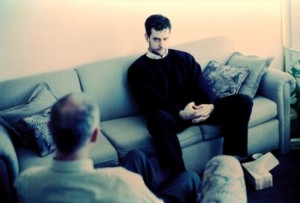 People often ask, “how does talking help? It can’t change anything can it?” Well, actually, it can. It is true that no amount of talking can change the fact that you were made redundant, had a serious operation, were bullied at work or lost someone dear to you. However, according to the ancient Greek philosopher Epictetus “it is not so much what happens to people that causes suffering, but the view they take of it.” Imagine, for example, that it rains on your much-needed day off, so that you cannot do what you had planned. You could get depressed and say, “oh, no, it is raining, now what am I going to do?”, and sit around moping for the rest of the day. Or you could curl up with a good book, go to the cinema, visit friends, have a good old sort out and tidy up, etc. In other words, there are a thousand and one enjoyable things you can do. Focussing on the one thing you can’t do is not going to make you feel good, and closes down your options to all other possibilities.
People often ask, “how does talking help? It can’t change anything can it?” Well, actually, it can. It is true that no amount of talking can change the fact that you were made redundant, had a serious operation, were bullied at work or lost someone dear to you. However, according to the ancient Greek philosopher Epictetus “it is not so much what happens to people that causes suffering, but the view they take of it.” Imagine, for example, that it rains on your much-needed day off, so that you cannot do what you had planned. You could get depressed and say, “oh, no, it is raining, now what am I going to do?”, and sit around moping for the rest of the day. Or you could curl up with a good book, go to the cinema, visit friends, have a good old sort out and tidy up, etc. In other words, there are a thousand and one enjoyable things you can do. Focussing on the one thing you can’t do is not going to make you feel good, and closes down your options to all other possibilities.
Cognitive Behavioural Therapy (CBT) helps people to recognise such unhelpful thinking habits and develop more positive ones. It can be seen as a kind of mental hygiene, a good spring clean of unhelpful thinking habits.
However, we also have a lot of habitual ways of understanding and reacting to the world of which we are not conscious. It is these unconscious habits that frequently sabotage our relationships and that are impossible to change without first becoming aware of them. So, although CBT is useful in helping us to challenge unhelpful habits and ways of thinking, it functions mainly at a conscious level. Some of our habitual ways of thinking and reacting are so deeply rooted though that most of the time we are unaware of them, in other words, they are unconscious.
Talking with a trained and experienced Relational therapist can reveal the roots of such unconscious patterns that often originate in childhood. Young children tend to assume that bad things happen because they are bad. So if, for whatever reason, a child did not experience sufficient warmth, love and attention, she may assume that this is somehow her fault. For many of us such early conclusions and assumptions form an unquestioned backdrop to our lives that continue to impact on our self-confidence and relationships.
Research carried out within the last few decades, however, has shown that if people can create a coherent story of their lives, and realise that although ‘bad things’ happened to them, they themselves are not ‘bad’, such out-dated patterns can be transformed. This is what is meant by ‘processing’ or ‘working through’ our experience. As these patterns have been there a long time, this is not a quick fix that can be completed in just a few sessions of therapy, but requires commitment from both client and therapist.
As I have discussed before, such ‘working through’ also helps to rewire (as it were) our brain by the creation of new, healthy neural pathways. So, no matter how painful or neglectful your early experience has been, it is possible to develop the emotional security that was missing in childhood, and have good relationships with your own children and others.
Further reading:
‘Relational Child, Relational Brain: Development and Therapy in Childhood and Adolescence (Evolution of Gestalt Series) by Robert G. Lee and Neil Harris (Ed.)

















